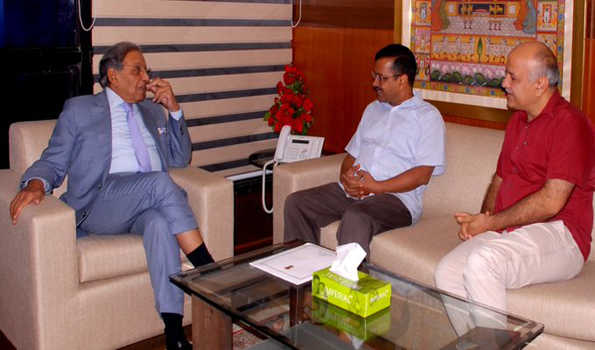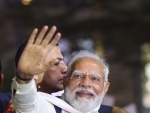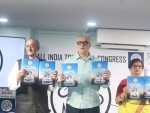
Arvind Kejriwal, Sisodia call on 15th Finance Commission Chairman N K Singh
New Delhi, Jul 26 (UNI) Chief Minister Arvind Kejriwal and Deputy CM Manish Sisodia on Friday called on the Chairman of 15th Finance Commission N K Singh, and handed over a memorandum demanding that the national capital gets its due share in central taxes.
The meeting was attended by senior officers of the Finance Commission and the Chief Secretary of Delhi Vijay Dev and Finance Secretary and Additional Chief Secretary Renu Sharma.
Presenting the case of Delhi, the Chief Minister informed the 15th Finance Commission chairman that the national capital has been subjected to gross injustice since last two decades.
'For the growth of the nation, Delhi gives Rs 1.75 lakh crore as income tax to the Centre. But, it gets back only Rs 325 crore from the Centre for its own growth. Centre should invest more in Delhi so that economic activities could grow in the national capital,' Mr Kejriwal said.
'Till the year 2000, the Constitution of India provided for money for Delhi in line with what the other states were getting. However, in the year 2000, the Constitution was amended and Delhi was removed from the list. Nothing can be done about what happened then. But what happened as a result was Delhi ceased of getting money from the Centre. This is injustice with Delhi,' the CM said.
'Our request to the Finance Commission is that Delhi should also get funds for development like other states of the country receive from the Centre. Finance Commission decides on how much of funds should be given to a particular state and thus we have made a request with them. We have asked them to give Delhi its due. We believe that if the formula of post-the year 2000 is implemented, Delhi will get Rs 6000 crore annually,' Mr Kejriwal stated.
In his letter, the Chief Minister has written, 'I would like to bring to your kind attention that the Government of NCT of Delhi has a separate Consolidated Fund w.e.f. December, 1993. The pattern of funding of Delhi’s Budget has been changed from the year 1994-95 and is at par with other States. The financial transactions of Government of NCT of Delhi including servicing of small saving loans are being met out of our own resources like other States.'
'Till the year 2000, under the provisions of article 280(3)(a) read with the article 270 of the Constitution, the task of the Union Finance Commission with respect to income tax was to make recommendations in regard to three matters, viz--the percentage of the 'net distributable proceeds' which shall represent the proceeds attributable to the Union Territories;the percentage of the divisible pool of the 'net proceeds' of income tax to be assigned to the States; and the share of each State in the divisible pool,' the letter read.
The letter further stated, 'Under article 270(3) of the Constitution, the share of the net proceeds of income tax 'attributable to the Union Territories' had to be prescribed. Accordingly, all the Union Finance Commissions till the Tenth Finance Commission had been giving recommendations for resource sharing not only between the States and the Union but also for the Union Territories including Delhi (please see Annexure 2). However, in the year 2000, the Constitution (Eightieth Amendment) Act, 2000 was passed by the Parliament, primarily for the purpose of including corporation tax with the personal income tax for the purpose of resource sharing between the States and Union of India. The Constitution (Eightieth Amendment) Act 2000 replaced article 270 with a new set provisions. In the new article 270, the erstwhile article 270(3) which had the enabling provision for the Finance Commissions to give recommendations in respect of Union Territories had been omitted(please see Annexure 3). Omission of erstwhile article 270(3) appears to be an inadvertent error on the part of the Law Department, since the Statement of Objects and Reasons appended to the Constitution (Eighty-Ninth Amendment) Bill, 2000 does not mention a word about proposal to leave the Union Territories out of the ambit of the Finance Commissions. Even the debates in the Parliament on this Bill did not make any mention about deletion of Article 270(3).'
'The unfortunate omission of article 270(3) resulted in an anomaly which has adversely affected the finances of the NCT of Delhi. The transfer of grants in lieu of share in Central Taxes has remained stagnant at Rs. 325.00 crore per annum since the year 2000 which happened to be the last year of the duration of the Tenth Finance Commission. Leaving out Union Territories out of the ambit of Finance Commissions, has only affected the Union Territories with Legislature since the Budget of the other Union Territories is entirely met from the Consolidated Fund of India,' the CM further wrote.
It further stated, 'The Tenth Finance Commission had recommended that 'Out of the net distributable proceeds of income tax, a sum equal to 0.927 per cent shall be deemed to represent the proceeds attributable to Union Territories. As regards, the Additional Duties of Excise, the share of the Union Territories should be treated as one unit, and their share determined on the same basis as that of all the States. Accordingly, the share of Union Territories amounting to 2.203 per cent should be retained by the Central Government'. Further during 1997-98, Government of India agreed to bring funding pattern of UTs which have their own Consolidated Fund closer to that of the States based on the recommendations of the Arjun Sengupta Committee. Transfer of grants in lieu of share in central taxes was agreed to be allowed to the UTs with Legislature as determined by the Bagchee Committee. As per the Bagchee Committee Report, the recommendations of the Tenth Finance Commission for the UTs was further divided for the individual UTs including Delhi and a deduction of 10% was made since Union of India provides for Delhi Police. The remaining share was determined at Rs. 325.00 crore for the year 2000 and the said amount continue to be provided till date by the Government of India.'
'As the capital of the country and one of the fastest growing metropolises, the claims on its resources are immense and varied. While the Government of NCT of Delhi has to maintain infrastructure that meets world standards, it also has to improve supply of civic amenities to the burgeoning population who legitimately expect employment and a fulsome life in the Capital. Consequently, large investments in Education, Health, Social, Food Securities, Transport, Roads & Hospitals etc. have to be made. But for the inadvertent omission of erstwhile article 270(3) of the Constitution of India, the Government of NCT of Delhi would be getting its legitimate Share in Central Taxes of at least Rs. 6500.00 crore per annum with an appropriate annual enhancement like other States to finance the development needs,' it further read.
'Further, Delhi has five Urban Local Bodies, of which three are major municipal corporations having population between 39 lakh to 62 lakh. The powers and functions of the municipalities in Delhi are the same as the local bodies in the other States. The omission of Local Bodies of Delhi for not giving the basic and performance grants on technical grounds does not help the constitutional mandate of strengthening the Local Bodies. The three municipal corporations of Delhi are under financial crunch and merit the same consideration from the Central Government. Delhi also devolves funds to the Local Bodies, at 12.5 per cent of its net tax proceeds on the basis of recommendations of the Delhi Finance Commission. The Fourteenth Finance Commission allocated Grant-in-Aid of Rs. 2,87,436 crore for the Local Bodies for the Award period 2015-2020 which works out to Rs. 488 per capita per annum. Delhi with population of 193.86 lakh should be provided at least Rs. 1150.00 crore with an appropriate annual enhancement as grant to Local Bodies of NCT of Delhi,' the CM said in the letter.
The letter further stated,'Vide the Constitution (Seventy-Fourth Amendment) Act, 1992, the State Finance Commission appointed under article 243(Y) is applicable to the Union Territories with Legislature under article 243 (ZB). To provide grants to Local Bodies, Delhi is equated with full fledged States and when it comes to receipt of share in Central Taxes, Delhi has been left out since the year 2000. This was never the intent of the makers of our Constitution.'
'I shall be grateful if you could kindly look into the matter personally and recommend the legitimate Share of NCT of Delhi in Central Taxes, basic & performance grants to local bodies and other grants if any being recommended to States for the Award period of the Fifteenth Finance Commission. The NCT of Delhi has the character of a State and therefore, there is a strong case for treating Delhi at par with States for the purpose of share of Central Taxes and its Local Bodies to get grants being recommended by the Fifteenth Finance Commission and even as a Union Territory, Delhi was being considered for recommendation for grants in lieu of Central Taxes till the Tenth Finance Commission,' concluded the Chief Minister in his letter.
Support Our Journalism
We cannot do without you.. your contribution supports unbiased journalism
IBNS is not driven by any ism- not wokeism, not racism, not skewed secularism, not hyper right-wing or left liberal ideals, nor by any hardline religious beliefs or hyper nationalism. We want to serve you good old objective news, as they are. We do not judge or preach. We let people decide for themselves. We only try to present factual and well-sourced news.







